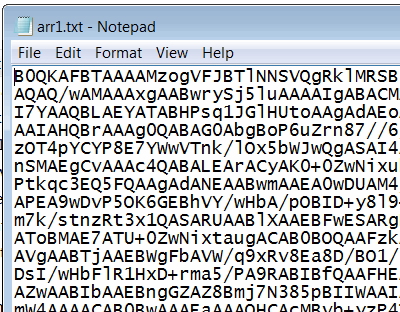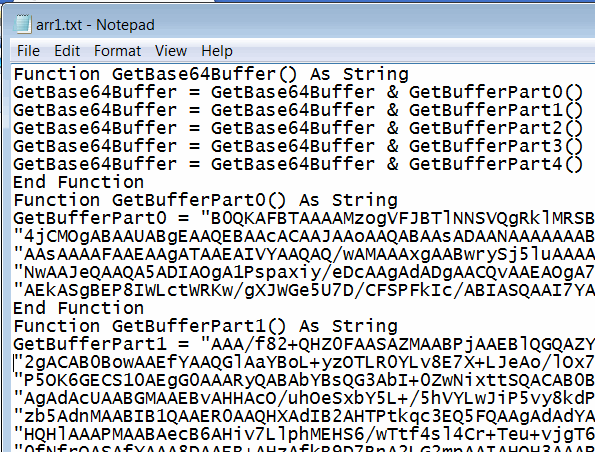Embed Array In Visual Basic 6 (VBA) code
In some cases it might be required to embed file or data directly into the Visual Basic 6 project or VBA macro. Resources are not supported in Visual Basic. The below functions demonstrate how to embed the binary array into the macro without the need to redistribute the data file.
Writing the array declaration
This option allows to output the array declaration into a text format which can be copy-pasted to the macro as variable declaration
Dim buff(5) As Byte
buff(0) = 1: buff(1) = 2: buff(2) = 3
buff(3) = 4: buff(4) = 5: buff(5) = 6
WriteArrayDeclarationToFile buff, "D:\arr.txt", "arr", "Byte", 2
Just copy the content of the generated file and paste into the macro module to embed the data.
Sub WriteArrayDeclarationToFile(buffer As Variant, filePath As String, varName As String, typeName As String, Optional elemsPerRow As Integer = 10)
Dim fileNo As Integer
fileNo = FreeFile
Open filePath For Output As #fileNo
Print #fileNo, "Dim " & varName & "(" & UBound(buffer) & ") As " & typeName
Dim i As Long
For i = 0 To UBound(buffer) Step elemsPerRow
Dim j As Long
Dim last As Long
If i + elemsPerRow > UBound(buffer) Then
last = UBound(buffer)
Else
last = i + elemsPerRow - 1
End If
Dim line As String
line = ""
For j = i To last
Dim val As String
val = buffer(j)
If LCase(typeName) = "string" Then
val = """" & val & """"
End If
line = IIf(line <> "", line & ": ", "") + varName & "(" & j & ")=" & val
Next
Print #fileNo, line
Next
Close #fileNo
End Sub
This approach however has a limitation as the size of the file would be much bigger than the size of the array (e.g. array of size 500 KB would generate the file of about 10 MB). This results into the 'Out of memory' error in Visual Basic
Writing the base64 encoded array
As the workaround array can be embedded as Base64 string. Follow the following article for the code example of encoding the byte array into base64 string
Dim buff(100) As Byte
...
WriteByteArrayDeclarationToFileAsBase64 buff, "D:\arr1.txt"
This would result in the following file to be created:
 { width=350 }
{ width=350 }
Declare the string constant and paste the value from this file. Decode this string to get the byte array.
This solution can also run into the limitation of the maximum symbols per line.
To overcome this use the 3rd parameter of WriteByteArrayDeclarationToFileAsBase64 method which allows to set the maximum number of symbols and automatically split the line with line continuation symbol:
WriteByteArrayDeclarationToFileAsBase64 buff, "D:\arr1.txt", 100
The function provides the workaround for the limitation of maximum numbers of continuations which is equal to 24 ('Too many line continuations') and splits the data in different functions.
As the result the data is written to the file in the following format:
 { width=350 }
{ width=350 }
To use this, copy the content into the module and call the GetBase64Buffer function from the code which will return the base 64 encoded array which can be decoded.
Sub WriteByteArrayDeclarationToFileAsBase64(buffer As Variant, filePath As String, Optional lineMaxLength As Integer = -1)
Const FUNC_NAME = "GetBufferPart"
Dim fileNo As Integer
fileNo = FreeFile
Open filePath For Output As #fileNo
Dim data As String
data = ConvertToBase64String(buffer)
data = Replace(data, vbLf, "")
If lineMaxLength > 1 Then
Const MAX_LINE_CONTINUATIONS As Integer = 24
Dim curLineIndex As Integer
Dim curCont As Integer
curLineIndex = 0
Dim i As Long
Dim funcsCount As Integer
funcsCount = Round((Len(data) - 1) / lineMaxLength / MAX_LINE_CONTINUATIONS) - 1
Print #fileNo, "Function GetBase64Buffer() As String"
For i = 0 To funcsCount
Print #fileNo, "GetBase64Buffer = GetBase64Buffer & " & FUNC_NAME & i & "()"
Next
Print #fileNo, "End Function"
Dim funcName As String
For i = 1 To Len(data) Step lineMaxLength
If curCont = MAX_LINE_CONTINUATIONS Then
curCont = 0
curLineIndex = curLineIndex + 1
End If
Dim length As Integer
Dim isLast As Boolean
isLast = False
If i + lineMaxLength > Len(data) Then
length = Len(data) - i + 1
isLast = True
Else
length = lineMaxLength
End If
curCont = curCont + 1
If curCont = 1 Then
funcName = FUNC_NAME & curLineIndex
Print #fileNo, "Function " & funcName & "() As String"
End If
isLast = isLast Or curCont >= MAX_LINE_CONTINUATIONS
Dim lineConc As String
lineConc = ""
If Not isLast Then
lineConc = " & _"
End If
Print #fileNo, IIf(curCont = 1, funcName & " = ", ""); """" & Mid(data, i, length) & """" & lineConc
If isLast Then
Print #fileNo, "End Function"
End If
Next
Else
Print #fileNo, data
End If
Close #fileNo
End Sub
Function ConvertToBase64String(vArr As Variant) As String
Dim xmlDoc As Object
Dim xmlNode As Object
Set xmlDoc = CreateObject("MSXML2.DOMDocument")
Set xmlNode = xmlDoc.createElement("b64")
xmlNode.DataType = "bin.base64"
xmlNode.nodeTypedValue = vArr
ConvertToBase64String = xmlNode.Text
End Function